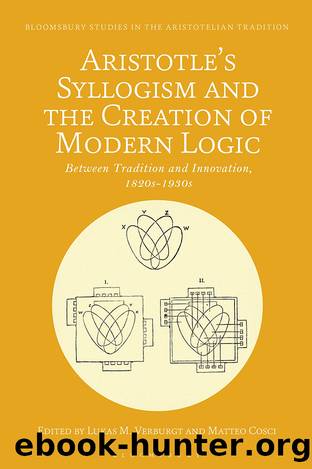Aristotle's Syllogism and the Creation of Modern Logic by Lukas M. Verburgt;Matteo Cosci;

Author:Lukas M. Verburgt;Matteo Cosci;
Language: eng
Format: epub, pdf
Publisher: Bloomsbury UK
8
Hugh MacColl: Never twist the syllogism again
Jean-Marie C. Chevalier
1 Introduction
Christine Ladd-Franklin thought it âunfortunate that Mr. MacCollâs valuable work in Logic should have met with almost complete neglect in Englandâ.1 Hugh MacColl still deserves a better place in the history of logic than he currently has, for his achievements are not few. He is famous for having developed a modern propositional logic a few years prior to the publication of Fregeâs Begriffsschrift, claiming that logic should not be a calculus of classes but of propositions. Russell called him âthe first to have found symbolic logic on propositions and implicationâ.2 Another of his contemporaries acknowledged that âin making the proposition the unit of thought, he has brought the symbolic logic into line with the general theory of modern logic to-dayâ.3 He is also known for debating with Russell the problem of the existential import of propositions and for their controversy on âifâ and âimplyâ. MacColl challenged the use of material implication, used the notion of propositional function, and opened the way to non-classical and modal logics and to logical pluralism.4 It has been claimed by specialists that âMacCollâs definition of the syllogism as an inference defined in terms of implication, however, was perhaps his more significant contribution to the over-all development of logicâ.5 Ladd-Franklin too considered it one of MacCollâs greatest accomplishments to have defined universal affirmative propositions in terms of implication, writing that â[t]he logic of the non-symmetrical affirmative copula, âall a is b,â was first worked out by Mr. MacCollâ.6 Nevertheless, MacCollâs goal was not to produce a new theory of syllogism, which he considered one of the many fields of application of his new symbolic logic: âNo part of logic has received so much attention and given rise to so much discussion as the syllogisms of Aristotle. This is why I have selected them as illustrations of the application of my symbolical method.â7 But there may be more to it: his insistence on the subject may also be âjustified by the fact that syllogistics is configured as a complete and structured deductive system, capable of providing a term of comparison for the deductive possibilities of a logical systemâ.8 He considered that the best illustration of the advantages of his symbolic logic was that he was not obliged, as so many logicians of time were, âto twist and torture simple sentences in order to adapt them for syllogistic reasoningâ.9
Starting from MacCollâs treatment of the syllogism (Section 3), this chapter intends to show how his theory of implication and of hypothetical propositions was embodied (Section 4), what his conception of âformal certaintyâ in syllogistic reasoning was (Section 5), how this came with a new conception of pure logic as propositional logic (Section 6), and finally how he could provide a solution to the problem of the presupposition of existence in syllogistic propositions (Section 7).
2 Biographical sketch
The Scottish mathematician and logician Hugh MacColl (1837â1909) lived in the northern French city of Boulogne-sur-Mer from 1865 until his death in 1909. His logical activity is usually divided into two periods, separated by an interval of literary creation.
Download
Aristotle's Syllogism and the Creation of Modern Logic by Lukas M. Verburgt;Matteo Cosci;.pdf
This site does not store any files on its server. We only index and link to content provided by other sites. Please contact the content providers to delete copyright contents if any and email us, we'll remove relevant links or contents immediately.
The remains of the day by Kazuo Ishiguro(8601)
Tools of Titans by Timothy Ferriss(8037)
Giovanni's Room by James Baldwin(7001)
The Black Swan by Nassim Nicholas Taleb(6868)
Inner Engineering: A Yogi's Guide to Joy by Sadhguru(6570)
The Way of Zen by Alan W. Watts(6388)
Asking the Right Questions: A Guide to Critical Thinking by M. Neil Browne & Stuart M. Keeley(5504)
The Power of Now: A Guide to Spiritual Enlightenment by Eckhart Tolle(5468)
The Six Wives Of Henry VIII (WOMEN IN HISTORY) by Fraser Antonia(5306)
Astrophysics for People in a Hurry by Neil DeGrasse Tyson(5059)
12 Rules for Life by Jordan B. Peterson(4195)
Housekeeping by Marilynne Robinson(4175)
The Ethical Slut by Janet W. Hardy(4097)
Skin in the Game by Nassim Nicholas Taleb(4074)
Double Down (Diary of a Wimpy Kid Book 11) by Jeff Kinney(4064)
Ikigai by Héctor García & Francesc Miralles(3987)
The Art of Happiness by The Dalai Lama(3950)
Skin in the Game: Hidden Asymmetries in Daily Life by Nassim Nicholas Taleb(3824)
Walking by Henry David Thoreau(3803)
